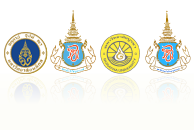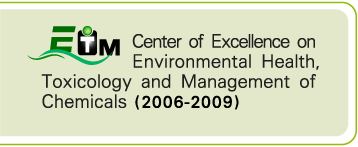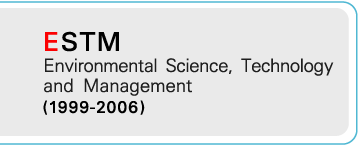About IU
The curriculum of the post-graduate program in Environmental Toxicology, Technology and Management has been created by the Chulabhorn Research Institute (CRI) through the support of UNDP. The curriculum development committee consisted of a team of local experts from Chulabhorn Research Institute (CRI), Mahidol University (MU), the Asian Institute of Technology (AIT) and a team of international experts from North America, Europe and the United Nations.
The design of the program is based on the recognition that in developing countries there is a severe shortage of trained and qualified personnel in both government and industry needed for policy/decision making, research/development and management of toxic chemicals to cope with rapid industrialization. It is also evident that effective management of toxic chemicals in developing countries requires technical and management personnel with broader background knowledge in both health science and environmental management.
This innovative, multidisciplinary program is a combination of health sciences, biotechnology and environmental engineering designed to train human resources capable of undertaking control and management of toxic chemicals as well as research and development in the areas of toxicology, technology (including biotechnology) and environmental management.
The special features of the program are:
- It is an international program with world renown international experts in the teaching faculty.
- Some courses are operated as a joint-effort between the program and leading foreign institutions such as Massachusetts Institute of Technology.
- Linkages have been established with various institutions in Europe and North America to conduct collaborative research and to supervise student dissertation research.
- Opportunities exist for Ph.D. students to receive research training at world renown institutes in USA, Europe and Asia. Graduates of this professional degree program will have the opportunity to familiarize themselves with global and international issues associated with chemicals and hazardous wastes and the current strategies to manage and solve problems through teaching by international experts from North America, European Union, Asian and international organizations who will join the program as visiting professors.
- In 2003, the program established a cooperation agreement with University of Utrecht in the Netherlands to offer the possibility for students from both sides to participate in our respective Ph.D. programs according to the specific requirements set for each program and to take another degree.
Master’s Degree Program : August each year is the normal time of admission and entry annually to the four-semester (24 months) Master’s degree program. Students have to complete a program of coursework of a minimum of 26 credits, and a research thesis (22 credits).
Doctoral Program : Doctoral degree students after receiving that M.Sc. from the same program are given flexible entry timing and are required to complete a minimum of 24 credits of coursework, of which not more than 6 credits are earned from special studies. Students must have taken their Advancement to Candidacy not later than the end of their third semester of study, and completed all the requirements for the Doctoral degree within five years of Advancement.
 Center of Excellence on Environmental Health and Toxicology (EHT)
Center of Excellence on Environmental Health and Toxicology (EHT)











